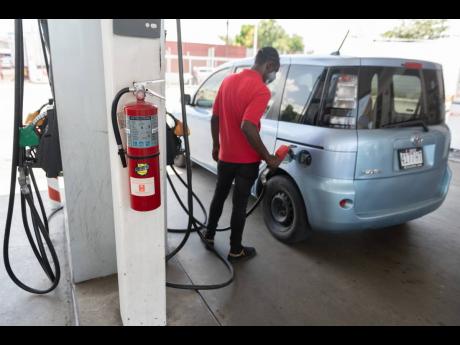Gas stations still lax on safety - Draft of new Petroleum Act almost ready
Yesterday, as The Gleaner visited several gas stations across the Corporate Area, there seemed to be a general dampening of fears sparked by a deadly fire that claimed one life five months ago at the Heaven’s FESCO service station in Mandeville, Manchester.
In the wake of the February 21 fire, jolted by the frightening scenes captured on cell phones as flames engulfed the Mandeville station, with at least seven persons being injured, several stakeholders across the island made pledges to carry out safety audits and introduce new protocols to limit injuries in case disaster struck at their operations.
The energy ministry, which also said that the Petroleum Act was being reviewed, admitted then that not all gas stations were inspected annually due to a staff shortage.
Not much has changed since.
Yesterday, Energy Minister Fayval Williams told The Gleaner that she is expecting the draft of the new petroleum legislation on her desk for review within a week before going to Parliament.
“What we were supposed to do is the part called the downstream that would set the regulations for the handling of natural gas and other regulations. We are at the final stages of that right now,” she said, adding that the period of consultation had been completed.
She said that there were still challenges with inspection of gas stations.
“Because there are so many of them relative to the staff we have, that’s why they are not inspected with regularity, but then again, that’s an area that we need to staff up on and ensure that at least once a year, a station is visited and assessed,” she said. “Are we there yet in terms of the staffing? Not quite yet, but that is something that is on our action list to get done because of the safety issues associated with it.”
Standardising protocols
There are about 330 gas stations islandwide, with about 55 per cent of them being members of the Jamaica Gasolene Retailers Association (JGRA). Its president, Gregory Chung, told The Gleaner that the association was still working to standardise fire-safety protocol.
“Each marketing company has their own procedures, and within that, has fire-safety protocols, and so we wanted to have a standard version for JGRA members … . Each one can have a little more, but the basic core of it is covered,” he said.
Chung pointed out, however, that the process was hit by COVID-19 delays.
“The association is almost done. I must say that we were delayed because of the COVID situation that came about in March, and we have been scrambling since,” he said. “I know our members have been scrambling to protect our employees, and, of course, to survive it economically and not catch the sickness.”
Nevertheless, the JGRA boss said that with things slowly getting back to normal, they should get back on track soon.
“As fas as other sources of safety protocol, I am not sure where the other regulatory agencies are on their standardisation, but as a JGRA standpoint, that was the commitment we had to help prevent any further occurrences within the industry,” Chung said.
He also said that the latest communication with the Government in relation to the new Petroleum Act dates back to several months ago.
“They were to update us with all the different changes based on the Petrojam Reform Committee. They had made some recommendations about how to prevent any bad-gas recurrence, and a lot of that they plan to put in the new Petroleum Act,” he said. “We will be looking at the issue of fire safety in the act. This meeting happened before January, so it’s a good six months or so since we met.”
Turning to the level of inspections since the Mandeville fire, Chung said: “Right now, they haven’t changed the schedule, but as it is, we have yearly inspection or as needed, meaning, if somebody calls and says there is a problem. We report to many agencies, and it’s a yearly inspection, or as needed. I am not aware if they have increased the inspection schedule.”
Concerns linger
Yesterday, our news team noticed lapses in safety protocols at several service stations throughout the Corporate Area, including the continued usage of such spaces as taxi depots.
At the RUBiS station on Eastwood Park Road in Half-Way Tree, St Andrew, several taxis were parked at the pumps and to the forefront of the gas station, blocking the exit in the event that there was any emergency.
The station supervisor, who said she was not authorised to speak to the media, told The Gleaner that the manager was unavailable for comment.
At the Epping station on Orange Street in the capital city, the station supervisor said they were keeping on the ball.
“Every week, we do safety meetings with the staff. They are adapting well, and we have had no incidents,” she reported.
When our news team swung by the Unipet gas station on the corner of Lyndhurst Road and South Road, we observed that none of the eight pump stations had a fire extinguisher. There was also none visible on the outside of the large gas station.
When The Gleaner approached the station manager, as he attempted to speak on safety regulations, another staff member stopped him in his tracks and said the question would be better suited for an executive based at the head office next door.
We were unable to get a comment from the person.
Daniel Farquharson died one day shy of his 60th birthday from injuries he sustained in the massive explosion that destroyed Heaven’s FESCO gas station in Mandeville, Manchester, on February 21.
The service station burst into flames after fuel was seen running on the ground.

